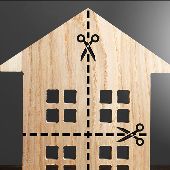Outgoing board members to return all official records … to the incoming board.
Now as benign as this may seem it speaks to a greater problem and that issue is: Where are all the association’s records? Why did the legislature have to go out of its way to create a specific law to obligate a proper transition from one board to the other? There must be a problem here.
The problem is that community associations have a lot of records and it goes beyond what a board of directors has control of because managers and management companies also have control of essential documents that very often go missing. Let’s take a few examples to demonstrate the problem.
A big wind comes and knocks off a couple of roofs in your association, it happens all the time. Well, the first thing that the insurance company wants are the maintenance records roofs going back seven years before they pay for the claim. No records…claim denied and its lawyer time. Another good one relating to community association collections, is that the board has decided to foreclose on Mister Delequaint for non-payment of assessments for the past five years. Mr. Delequaint arrives in court and his lawyer asks the association’s attorney to provide the proof of mailing for the budgets for said five years and they are nowhere to be found. As a matter of fact even the budgets are stone cold lost.
The judge can very well possibly rule in favor of Mr. Delequaint (no association foreclosure) and even award him prevailing attorney fees. All these maladies could have been avoided if the association had a document retention policy and followed the protocol.
Let’s face the facts and understand that community associations are volatile environments and calling them dynamic is kind. Boards of Directors change, emotions run high, management companies are dismissed frequently, as are attorneys, vendors and whoever else gets an opportunity to work for an association. In the middle of all of this mess records, contracts, ledgers, insurance policies, minutes, proof of mailings, warranties, governing documents, proof of meeting notices, notes and everything else that can be put on paper fall into a deep dark abyss never to be found again. Sometimes by accident and often by design by disgruntled board members, dismissed employees (managers), or untrained office staff who may feel that the round file is for everything that is over a year old.
So now that the problem has been identified what is the solution? First as mentioned above, the board of directors must establish a record keeping policy and protocol (vote on it and put it in the minutes). Don’t lose those minutes and approve them at the next meeting. Said policy should identify all the records that an association must keep and for how long. This is easy because it’s all in the statutes (for Florida condos 718.111 and Florida HOAs 720.305) and I doubt that any state does not address this issue.
The next thing is:
HOW can an association keep these records from disappearing never to be found again? There are many ways to go about this and technology may have the answer. Although it might seem to be expensive it is possible that all documents be kept electronically and not just on paper.
Have them scanned and put them away on a remote server. This technology also gives an association a backup just in case that big wind comes and blows away your office or the management office.
Once again referring to Florida condo statutes 718.111(12)(b) it is crystal clear that documents can be maintained in digital format. In Florida HOA statutes 720.303(5) the legality of keeping records in digital form is not so clear but it is still a prudent idea. No matter what your board comes up with you should be able to easily get your hands on the minutes of a meeting from five years ago or all the maintenance records for the roofs. Try it and if you cannot put your eyes on them it proves that your community association has a problem that needs to be fixed right away.
Find the right companies to help you with Digital Record Keeping, Websites and Accounting.
Tags:
Board of Directors,
Condo & HOA Accounting,
Condo & HOA Elections














 Jan Bergemann is president of Cyber Citizens For Justice, Florida ‘s largest state-wide property owners’ advocacy group. CCFJ works on legislation to help owners living in community associations. He moved to Florida in 1995 – hoping to retire. He moved into a HOA, where the developer cheated the homeowners and used the association dues for his own purposes. End of retirement!
Jan Bergemann is president of Cyber Citizens For Justice, Florida ‘s largest state-wide property owners’ advocacy group. CCFJ works on legislation to help owners living in community associations. He moved to Florida in 1995 – hoping to retire. He moved into a HOA, where the developer cheated the homeowners and used the association dues for his own purposes. End of retirement!
 HOA bank statements are just as they sound: a statement from the bank showing all deposits and withdraws from each association account over a certain period of time. The most effective way to prevent fraud within your community association is to keep a close eye on bank statements. Most associations have at least two accounts: an operating account for regular costs of running a community association and a reserve account for setting aside funds for future projects.
HOA bank statements are just as they sound: a statement from the bank showing all deposits and withdraws from each association account over a certain period of time. The most effective way to prevent fraud within your community association is to keep a close eye on bank statements. Most associations have at least two accounts: an operating account for regular costs of running a community association and a reserve account for setting aside funds for future projects.

 Commercial Fitness Products, a Florida based organization, has been serving the fitness needs of our customers nationwide for over 27 years. Our primary focus is Multi-Housing & Hospitality, as such, we stay current on the latest industry trends, and are able to share ideas on how we may equip or improve any community fitness center. We provide more than just equipment…our goal is to delight your residents & guests by providing them an exceptional fitness environment.
Commercial Fitness Products, a Florida based organization, has been serving the fitness needs of our customers nationwide for over 27 years. Our primary focus is Multi-Housing & Hospitality, as such, we stay current on the latest industry trends, and are able to share ideas on how we may equip or improve any community fitness center. We provide more than just equipment…our goal is to delight your residents & guests by providing them an exceptional fitness environment. LE OF FITNESS SAFETY PARTITIONS
LE OF FITNESS SAFETY PARTITIONS
